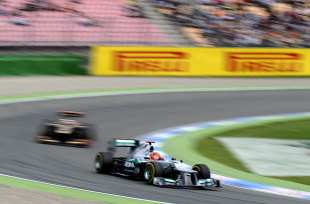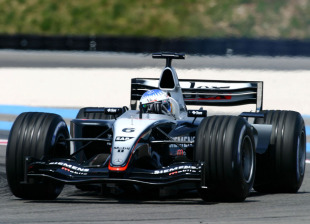
- Drivers:
- Jenson Button
- |
- Mika Häkkinen
- |
- Robert Manzon
- |
- Kimi Räikkönen
- |
- Michael Schumacher
- |
- Ayrton Senna
Who has set the fastest lap in a Grand Prix most often? asked Tom Underwood
It's probably not a great surprise to find Michael Schumacher atop this list - he set the fastest lap during a GP on no fewer than 77 occasions. And it's also not entirely a shock to find Alain Prost (41) in second place. But the identity of the top current driver, in third place, might surprise a few: it's Kimi Raikkonen, with 38. Next come Nigel Mansell (30) and Jim Clark (28, from only 72 starts). The non-champion with the most fastest laps is Gerhard Berger, who's in tenth place with 21.
Which F1 circuit is known as the "magic track"? asked Michael Powell
The answer here is Monza, the famous old track in Italy which has staged the Italian GP every year bar one (1980) since the official world championship started back in 1950. Italians often fondly call it "La Pista Magica" or the magic track. The Autodromo Nazionale Monza was opened in 1922 - one of the first purpose-built motor-racing circuits in the world. Some drivers have been less charitable about the "magic" track, especially when the old banked curves were used, which speeded up a race that was already dizzyingly fast. The banking was used for some GPs between 1955 and 1961 before being abandoned as it over-stressed the cars ... and the drivers!
Kimi Raikkonen collected points for the 21st race running in Bahrain. What's the record? asked Nick Harrison
Kimi Raikkonen currently lies third on this particular list, with 21 consecutive points finishes. The record was threatened last year, when Fernando Alonso completed 23 races in the points in Hungary - but he failed to finish the next one, in Belgium, after being caught up in a spectacular accident - also involving Lewis Hamilton and Romain Grosjean - at the first corner. That left Alonso one behind the record, another one held by Michael Schumacher, who had 24 successive finishes in the points between the 2001 Hungarian GP and the 2003 Malaysian one - a run that included every race in 2002.

I noticed that there was no McLaren MP4-18, why was this? Probably a bad move, since skipping to the MP4-19 brought them their worst results for years! asked Sean Craddock from Ireland
This was back in 2003 when, after racing the MP4-17 throughout 2002, the new design didn't quite develop as hoped for. ESPNF1's Laurence Edmondson explained: "There was an MP4-18, but it never raced due to problems in testing and it also failed side-impact tests twice. Eventually McLaren cut their losses and went with the MP4-17D (a revised version of the MP4-17) for the 2003 season, but they did continue to develop the concepts seen on the MP4-18. In the end the 17D proved very solid and won the first two races (but no more) and took Kimi Raikkonen within two points of winning the title. The 18 was then developed into the MP4-19 for 2004, but was still slow and unreliable until a fairly major overhaul for the French GP when McLaren brought the MP4-19B. Raikkonen won in Belgium, and by 2005 Adrian Newey had nailed the concept with the MP4-20, which was the fastest car of 2005 but lost out on the title due to reliability issues."
Who is the oldest surviving Grand Prix driver? asked Charles Barton
I hope I'm not tempting fate in answering this one, but the oldest surviving man who drove in a world championship Grand Prix is currently the Frenchman Robert Manzon, who took part in 29 races in the 1950s, with two third places - in Belgium in 1952 (in a Gordini) and France in 1954 (Ferrari). Manzon was born on April 12, 1917, so has just celebrated his 96th birthday. The oldest surviving Grand Prix winner is the Argentinian Jose Froilan Gonzalez, 90, who won the British GPs of 1951 and 1954 in Ferraris; the oldest surviving world champion is Jack Brabham, who won the title in 1959, 1960 and 1966: he was 87 on April 2.
I noticed that Mika Hakkinen drove in 96 GPs before winning one. Is this a record for someone who later became world champion? asked Chris Carlisle
It's not quite a record, because Jenson Button took part in 113 GPs before he finally won one, in Hungary in 2006. Other future world champions who had a lot of races before their first win were Nigel Mansell (72), Jochen Rindt (50) and Keke Rosberg (49). Among current drivers Mark Webber has 130 races before his first win, Nico Rosberg 111 and Felipe Massa 66. Adrian Sutil has currently taken part in 94 races without winning one - he's the top current driver on that particular list, and 15th overall.
If you want to ask Steven a question, use our feedback form. The most interesting questions will be answered here every other Friday. His long-running Ask Steven column on Cricinfo remains one of that site's most popular features
© ESPN Sports Media Ltd.
 If you want to ask Steven a question, use our feedback form. The most interesting questions will be answered here every other Friday. His long-running Ask Steven column on Cricinfo remains one of that site's most popular features Ask Steven features a number of experts, headed by Steven Lynch, who answer your questions across Formula One as well as a variety of other sports
If you want to ask Steven a question, use our feedback form. The most interesting questions will be answered here every other Friday. His long-running Ask Steven column on Cricinfo remains one of that site's most popular features Ask Steven features a number of experts, headed by Steven Lynch, who answer your questions across Formula One as well as a variety of other sports

